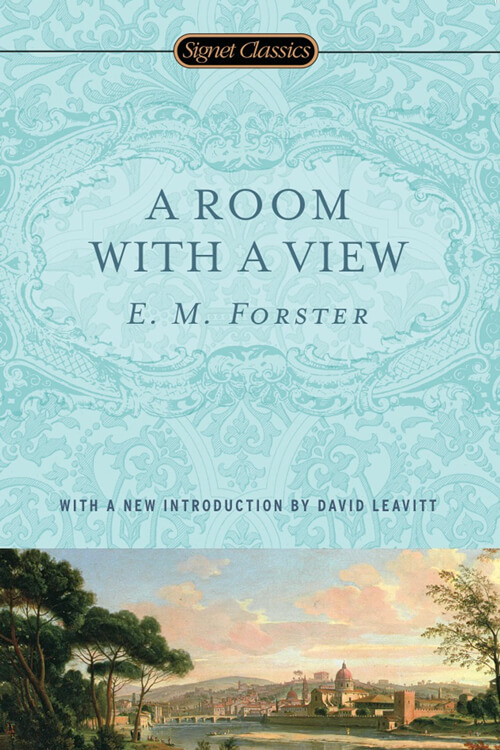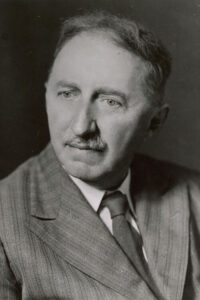
A Room With A View
The Signora had no business to do it,” said Miss Bartlett, “no business at all. She promised us south rooms with a view close together, instead of which here are north rooms, looking into a courtyard, and a long way apart. Oh, Lucy!”
“And a Cockney, besides!” said Lucy, who had been further saddened by the Signora’s unexpected accent. “It might be London.” She looked at the two rows of English people who were sitting at the table; at the row of white bottles of water and red bottles of wine that ran between the English people; at the portraits of the late Queen and the late Poet Laureate that hung behind the English people, heavily framed; at the notice of the English church (Rev. Cuthbert Eager, M. A. Oxon.), that was the only other decoration of the wall. “Charlotte, don’t you feel, too, that we might be in London? I can hardly believe that all kinds of other things are just outside. I suppose it is one’s being so tired.”
“This meat has surely been used for soup,” said Miss Bartlett, laying down her fork.
“I want so to see the Arno. The rooms the Signora promised us in her letter would have looked over the Arno. The Signora had no business to do it at all. Oh, it is a shame!”
“Any nook does for me,” Miss Bartlett continued; “but it does seem hard that you shouldn’t have a view.”
Lucy felt that she had been selfish. “Charlotte, you mustn’t spoil me: of course, you must look over the Arno, too. I meant that. The first vacant room in the front—”
––“You must have it,” said Miss Bartlett, part of whose travelling expenses were paid by Lucy’s mother—a piece of generosity to which she made many a tactful allusion.
“No, no. You must have it.”
Read or download Book
E. M. Forster
Edward Morgan Forster OM CH (1 January 1879 – 7 June 1970) was an English author, best known for his novels, particularly A Room with a View (1908), Howards End (1910), and A Passage to India (1924).
He also wrote numerous short stories, essays, speeches, and broadcasts, as well as a limited number of biographies and some pageant plays. He also co-authored the opera Billy Budd (1951). Today, he is considered one of the most successful Edwardian-era English novelists. After attending Tonbridge School he studied history and classics at King’s College, Cambridge, where he met fellow future writers such as Lytton Strachey and Leonard Woolf. He then traveled throughout Europe before publishing his first novel, Where Angels Fear to Tread, in 1905. Many of his novels examine class differences and hypocrisy. He was nominated for the Nobel Prize in Literature in 22 separate years.
Work
Forster had five novels published in his lifetime. Although Maurice was published shortly after his death, it had been written nearly sixty years earlier. He never finished a seventh novel, Arctic Summer.
His first novel, Where Angels Fear to Tread (1905), tells of Lilia, a young English widow who falls in love with an Italian, and of the efforts of her bourgeois relatives to get her back from Monteriano (based on San Gimignano). Philip Herriton’s mission to retrieve her from Italy has features in common with that of Lambert Strether in Henry James’s The Ambassadors. Forster discussed that work ironically and somewhat disapprovingly in his book Aspects of the Novel (1927). The novel was adapted as a 1991 film directed by Charles Sturridge.
Next, Forster published The Longest Journey (1907), an inverted Bildungsroman following the lame Rickie Elliott from Cambridge to a career as a struggling writer and then a post as a schoolmaster, married to an unappealing Agnes Pembroke. In a series of scenes on the Wiltshire hills, which introduce Rickie’s wild half-brother Stephen Wonham, Forster attempts a kind of sublime related to those of Thomas Hardy and D. H. Lawrence.
Forster’s third novel, A Room with a View (1908), is his lightest and most optimistic. It was started in 1901, before any of his others, initially under the title Lucy. It explores young Lucy Honeychurch’s trip to Italy with a cousin and the choice she must make between the free-thinking George Emerson and the repressed aesthete Cecil Vyse. George’s father Mr Emerson quotes thinkers who influenced Forster, including Samuel Butler. It was adapted as a film of the same name in 1985 by the Merchant Ivory team, starring Helena Bonham Carter and Daniel Day-Lewis, and as a televised adaptation of the same name in 2007 by Andrew Davies.
Where Angels Fear to Tread and A Room with a View can be seen as Forster’s Italian novels. Both include references to the famous Baedeker guidebooks and concern narrow-minded middle-class English tourists abroad. The books share themes with his short stories collected in The Celestial Omnibus and The Eternal Moment.
Howards End (1910) is an ambitious “condition-of-England” novel about various groups among the Edwardian middle classes, represented by the Schlegels (bohemian intellectuals), the Wilcoxes (thoughtless plutocrats), and the Basts (struggling lower-middle-class aspirants). Howards End was adapted as a film in 1992 by the Merchant-Ivory team, starring Vanessa Redgrave, Emma Thompson, Anthony Hopkins, and Helena Bonham-Carter. Emma Thompson won the Academy Award for Best Actress for her performance as Margaret Schlegel. It was also adapted as a miniseries in 2017. An opera libretto Howards End, America was created in 2016 by Claudia Stevens.






